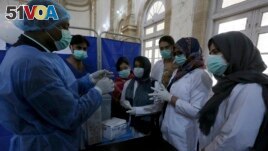10 February 2021
A program supported by the United Nations says it is ready to deploy coronavirus vaccines to the neediest people, especially in poor countries. The COVAX program announced its plans last week to provide 100 million doses of vaccine by the end of March. It expects to give out 200 million more doses by July.
Leaders of COVAX said most of the doses for the first distribution will come from British-Swedish drug maker AstraZeneca. The company's partner, the Serum Institute of India, will also provide doses of the same vaccine.

FILE - Paramedic staff attend a training session at a center newly setup for upcoming COVID-19 vaccination, in Karachi, Pakistan, Saturday, Jan. 30, 2021. Pakistan officials have set up centers in all districts of the country to administer COVID19 vaccines, which will start soon.
Frederik Kristensen co-leads the program Coalition for Epidemic Preparedness Innovation. He told a video news conference that the plans come at an important time as new forms of the coronavirus have appeared.
"We are on a path to really start balancing out" the problem of wealthy countries being vaccinated before poorer countries, he said.
Dr. Seth Berkley leads the international non-profit organization GAVI, the Vaccine Alliance. It is administering the COVAX program along with the World Health Organization and the Coalition for Epidemic Preparedness Innovations. Berkley said COVAX plans the first distribution of 336 million doses of the AstraZeneca vaccine to go to several countries until June.
GAVI expects that nearly 100 million of those doses will start being distributed to targeted countries by the end of March, officials said.
Another 1.2 million doses of the vaccine from companies Pfizer and BioNTech are expected to be shared by 18 countries in the first three months of the year. The companies already have been selling and distributing their vaccine to wealthy countries.
"Of course, we would like more BioNTech vaccines in the first and second" parts of the year, said Berkley. "That is what we were offered given the demand and supply that was there."
Berkley noted that AstraZeneca vaccine's first distribution was 57 million doses fewer than had been planned. He said delays were caused by countries needing emergency use approval from the World Health Organization. He noted it was not a result of supply problems, like those in Europe.
The AstraZeneca vaccine distribution depends on the World Health Organization giving emergency use permission, which is expected this month. The Pfizer-BioNTech vaccine is already approved. Supplying it to poorer nations is difficult because the vaccine must be stored at extremely cold temperatures.
GAVI pointed to a number of issues that could still hurt plans for the distribution. The group said the plan requires regulatory approvals, supplies, coordination and the readiness of countries to receive the vaccines.
About 190 countries and territories that are taking part in the COVAX plan have been waiting for details. That includes upper- and middle-income countries that have paid money and 93 lower-income countries which are expected to benefit.
India is expected to get most of the 240 million AstraZeneca doses that the Serum Institute is producing. Pakistan is to receive over 17 million, while Malawi is to get nearly 1.5 million doses and Haiti about 876,000.
A South Korean factory is producing another 96 million doses of the AstraZeneca product. Brazil is expected to receive over 10 million doses, Egypt more than 5.1 million, Iran over 4.2 million and Canada more than 1.9 million.
Henrietta Fore is executive director of UNICEF, the United Nations children's agency. She announced a long-term supply deal with the Serum Institute for the AstraZeneca vaccine and one from U.S. drug maker Novavax. It will provide to up to 1.1 billion doses of vaccine for 100 countries. The cost to lower- and middle-income countries is to be about $3 a dose.
I'm Caty Weaver. I'm John Russell.
The Associated Press reported this story. Alice Bryant adapted it for VOA Learning English. Mario Ritter, Jr. was the editor.
______________________________________________________________
Words in This Story
dose –n. the amount of a medicine or vaccine needed to prevent or cure sickness
distribution –n. a specific effort to give or deliver something, a good or product, to a large number of people
phase –n. a step in a process; one part in a series of related actions
regulatory –adj. making or concerned with making official rules about what is acceptable in a particular business or activity such as medicine
income –n. money that is earned from work, investments, business, or similar activities
benefit –n. a good, helpful or useful result